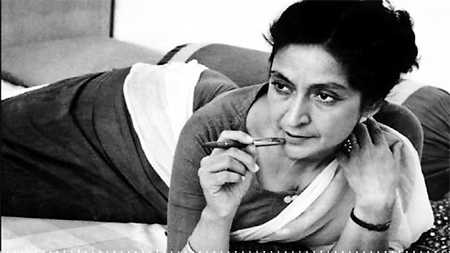I got the opportunity to see Amrita Pritam and listen to her marvelous poetry first when she attended a kavi darbar organised on the grounds of Malwa Khalsa High School in Ludhiana in 1958. I was in the eighth standard at the time.
Only a few days before that our Punjabi teacher Gyani Ram Singh had taught us her famous poem, “Ajj Aakhaan Waris Shah Nu”; it brought tears to his eyes. I remember a line from a poem she recited in her sweet voice at the event, “Mombatti dil wali raat bhar jaldi rahi”.
Till date I cherish the image of a 40-year-old petite but beautiful woman with poise. She personified what her contemporary writers would imagine a ‘dream woman’ to be. Her elegy addressed to Waris Shah brought her much acclaim, and is today considered a common cultural link between India and Pakistan.
On one occasion a cultural group visited Punjabi Bhawan, Ludhiana, from Pakistan to attend a function. A friend among them told me that in Pakistan there were some people who would keep the poem “Ajj Aakhaan...” on a piece of paper folded in their pockets.
She was born on August 31, 1919, at Gujranwala in the home of Gyani Kartar Singh Hitkari, a renowned scholar of Braj Bhasha who wanted his daughter to become a poet. He introduced Amrita to the basics of prosody. She is said to have once been given such a severe beating by her father that it made a mark on her face. It was because she had failed to follow the meter properly. At 11, Amrita lost her mother. As she distressed over the loss, her father encouraged her to write poetry to cope with the emotions.
It was in this pain of separation at a young age and the demanding guidance of her father that the great poet we remember today as Amrita Pritam was forged. She married Pritam Singh, a cloth merchant of Anarkali Bazaar, at the age of 16 in 1935. As a newly married girl she wrote poems even in the praise of her husband, but their relation did not last long, and they were separated in 1960.
There is a popular myth associated with her iconic poem. She was travelling in a train to Delhi after losing everything during Partition. As she looked out into the darkness of the night, she thought she saw some tombs. In that poignant moment it appeared to her that there was also the grave of Waris Shah among them. She did not have a pen with her, but could not hold back the urge to put down on paper the words that welled up in her heart. She is said to have cut a finger to write in blood the opening lines addressed to one of the greatest love poets of all time, Waris Shah. She completed the poem after reaching the refugee camp in Delhi.
Amrita was a versatile writer who produced novels, short stories, pen sketches of contemporary writers and biographies, but her first love remained poetry. At a later stage in life she edited literary magazines ‘Nagmani’ and ‘Samdarshi’, which became a craze at the time, especially among writers, who considered it an accomplishment to be published in them.
Her poetic journey was long, and passed through many stations over her lifetime. She had started out with the subjects of religion and morality with “Amrit Lahran” and then went on to romanticism with “Pathar Geetey”, “Lamia Wattan”, “Sarghi Vela”, “Lok Peera”, before Partition. The next stage in her life was symbolised by the famous book “Sunehadey”, which fetched her the prestigious Sahitya Academy Award in 1956. The last phase of her poetry was from 1961 to 1972, when she poured out her poetic heart in books such as “Nagmani” and “Kagaz te Canvas”. The latter won her the Bhartiya Jnanpith Award in 1982.
Of course, there was hardly an honour that did not come her way — the Padma Shri in 1969, Padma Vibhushan in 2004. The film “Pinjar” based on her novel by the same name made her a household name. For her popularity and literary excellence she was nominated member of the Rajya Sabha from 1986 to 92. Amrita Pritam’s writings have been translated in many languages around the world, including English, German and Spanish, apart from Indian languages. She was accorded a D.Litt. by Delhi University. She was once honoured by Pakistan’s Punjabi Academy, where she is said to have remarked, “Bade dino baad mere maike ko meri yaad aayi (my maternal home has remembered me after a long time)”.
Amrita’s name is often associated with Sahir Ludhianvi, who influenced her to such an extent that she also started writing progressive poetry. Once Khushwant Singh told her that her whole life story could be put down on a revenue stamp. Thence came her famous autobiography “Rasidi Ticket”, in which she boldly spoke of her relation with Sahir. In the closing years of her life she lost her memory, not recognising people she had long known, and was confided to the bed. The end came in sleep on October 31, 2005, in Delhi at the age of 85.
The writer is a former Government College, Ludhiana, professor.
Unlock Exclusive Insights with The Tribune Premium
Take your experience further with Premium access.
Thought-provoking Opinions, Expert Analysis, In-depth Insights and other Member Only Benefits
Already a Member? Sign In Now










